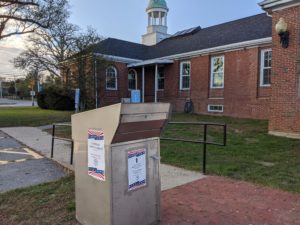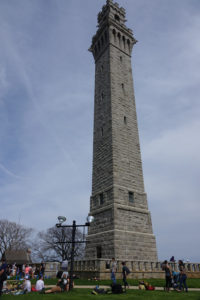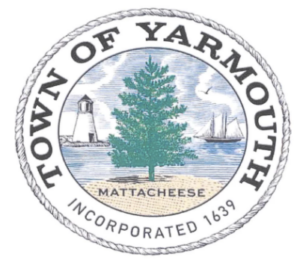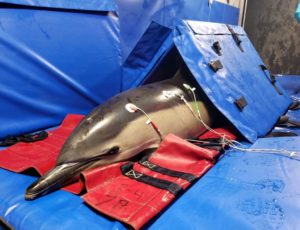
WAREHAM – A retired state trooper of Wareham is among six indicted on bribery conspiracy charges related to giving passing scores on the Commercial Driver’s License test, including to individuals who had never taken the skills test in the first place.
Perry Mendes, 63, is part of the group facing a 74-count indictment, including charges such as extortion, mail fraud, falsification of records and false statements.
The retired state trooper served from 2014 to 2022. The CDL exam tests applicant’s abilities to drive commercial vehicles like school buses and trucks on open roadway.
The following is the full statement from the US Department of Justice:
Two current and two former Massachusetts State Police (MSP) troopers are among six charged in a 74-count indictment in connection with an alleged conspiracy to falsify records and give passing scores to certain Commercial Driver’s License (CDL) applicants, including individuals who had failed or did not take the CDL skills test, in exchange for bribes.
The following individuals have been indicted on three counts of conspiracy to falsify records; three counts of conspiracy to commit extortion; three counts of extortion; six counts of honest services mail fraud; 31 counts of falsification of records; 27 counts of false statements; and one count of perjury:
Gary Cederquist, 58, of Stoughton;
Calvin Butner, 63, of Halifax;
Perry Mendes, 63, of Wareham;
Joel Rogers, 54, of Bridgewater;
Scott Camara, 42, of Rehoboth; and
Eric Mathison, 47, of Boston.Butner and Mendes were arrested yesterday in Southern and Middle District of Florida, respectively. They will appear in federal court in Boston at a later date. The remaining defendants were arrested this morning and will appear in federal court in Boston at 2 p.m. this afternoon.
According to the charging document, MSP Sergeant Cederquist was in charge of MSP’s CDL Unit, of which Trooper Rogers and retired Troopers Butner and Mendes were members.
Members of MSP’s CDL Unit were responsible for administering CDL skills tests. Test requirements for CDLs are established by the Federal Motor Carrier Safety Administration, which is part of the U.S. Department of Transportation. The CDL skills test is a demanding, in-person test that consists of three segments: Vehicle Inspection, in which an applicant is tested on their knowledge of the vehicle; Basic Control Skills, in which an applicant is tested on their ability to perform certain maneuvers; and the Road Test, in which an applicant is tested on their ability to drive a commercial vehicle on an open roadway.
In Massachusetts, the pass rate was 48% in 2019, 44% in 2020, 41% in 2021 and 41% in 2022. Test scores reported by members of MSP’s CDL Unit are material to whether applicants meet federal requirements for, and therefore whether the Registry of Motor Vehicles (RMV) is permitted to issue said applicants, CDLs. Class A CDLs are required to drive combination vehicles (e.g., tractor-trailers). Class B CDLs are required to drive heavy single vehicles (e.g., box trucks, school buses).
According to the charging document, between in on or about May 2019 and January 2023, Cederquist, Butner, Mendes, Rogers and others conspired to give preferential treatment to at least 17 CDL applicants by agreeing to give passing scores on their skills tests whether or not they actually passed, using the code word “golden” to identify these applicants who received special treatment. The indictment alleges that the following texts, some by Cederquist and others by Butner, were sent about some of these applicants:
“Your buddy passed yesterday he owes you that’s an automatic Fail leaving the door open!!!;”
“This guys a mess. Lol. He owes u a prime rib 6inch. 4 compounds and no watch;”
“Your buddy is a mess. He owes you big time. He will be fine though. Anything for you;”
“Golden mess. 🤣🤣🤣🤣🤣🤣;”
“He’s a mess Class A truck 2psi loss with truck running truck cut our again while timing 🤣🤣🤣🤣;” and
“Total mess this guy I think some time we should just do what we can but not golden.”Each of these applicants received a passing score on their skills test.
Additionally, it is alleged that Cederquist gave preferential treatment to four Class A CDL applicants who were MSP Troopers by falsely reporting that each trooper took and passed a Class A skills test. In reality, however, it is alleged that the Troopers did not pass the skills test and that they drove a vehicle which did not qualify as a Class A vehicle. It is alleged that Cederquist conspired with his friend Camara, who worked for a truck-driving school in Brockton, to accomplish this offense.
It is further alleged that Cederquist conspired with his friend Mathison, who worked for a spring water company that employed drivers who needed CDLs, to give passing scores to certain applicants affiliated with the water company. The indictment alleges that Cederquist gave passing scores to three such applicants who actually failed, in exchange for bribes of free inventory from the water company, such as cases of bottled Fiji, VOSS and Essentia water, cases of bottled Arizona Iced Tea, and coffee and tea products, all of which Mathison delivered to an office trailer at the CDL test site in Stoughton. The indictment alleges that Cederquist sent Mathison a text describing one of these applicants as “an idiot,” who had “no idea what he’s doing,” and “should have failed about 10 times already.” It is alleged that Cederquist then texted Mathison that Mathison’s boss “owes big time.”
The indictment also alleges that Butner assisted with this conspiracy, including by giving Mathison a key to the Stoughton yard so that Mathison could drop off water company inventory even when the test site was closed. The indictment alleges that Mendes also took part in the conspiracy, including by accepting cases of Fiji and VOSS water from Mathison immediately after administering an incomplete skills test to a new driver for the water company, with Mathison helping to put the cases in Mendes’s cruiser. It is alleged that on one occasion Mathison texted Cederquist that he was heading to the water company’s warehouse in Bridgewater, writing: “Was heading to Bridgewater seeing if you all need anything on return trip. Did you get a new key for the midnight express,” to which Cederquist replied, “Not yet but I need Voss and Italian toast espresso and some decaf for an old timer at the office.”
According to the charging document, in addition to Mathison’s bribes of free inventory from the water company, Cederquist accepted additional bribes in exchange for using his official position as the Sergeant in charge of MSP’s CDL Unit to give preferential treatment to certain CDL applicants including, but also a $750 granite post and mailbox; a new driveway valued at over $10,000; and a snow blower valued at nearly $2,000. The indictment alleges that Cederquist described one such applicant as “horrible,” and “brain dead,” but gave him a passing score anyway in exchange for the snow blower.
All CDL recipients identified as not qualified in the course of this investigation have been reported to the Massachusetts Registry of Motor Vehicles.
The investigation remains ongoing.
The charges of conspiracy to falsify records each provide for a sentence of up to 20 years in prison, up to three years of supervised release and a fine of up to $250,000. The charges of conspiracy to commit extortion each provide for a sentence of up to 20 years in prison, up to three years of supervised release and a fine of up to $250,000. The charges of extortion each provide for a sentence of up to 20 years in prison, up to three years of supervised release and a fine of up to $250,000. The charges of honest services mail fraud each provide for a sentence of up to 20 years in prison, up to three years of supervised release and a fine of up to $250,000. The charges of falsification of records each provide for a sentence of up to 20 years in prison, up to three years of supervised release and a fine of up to $250,000. The charges of false statements each provide for a sentence of up to five years in prison, up to three years of supervised release and a fine of up to $250,000. The charge of perjury provides for a sentence of up to five years in prison, up to three years of supervised release and a fine of up to $250,000. Sentences are imposed by a federal district court judge based upon the U.S. Sentencing Guidelines and statutes which govern the determination of a sentence in a criminal case.
Acting United States Attorney Joshua S. Levy; Michael J. Krol, Special Agent in Charge of Homeland Security Investigations in New England; and Christopher A. Scharf, Special Agent in Charge, U.S. Department of Transportation Office of Inspector General, Northeast Region made the announcement today. Assistant U.S. Attorneys Christine J. Wichers and Adam W. Deitch of the Public Corruption & Special Prosecutions Unit are prosecuting the case.
The details contained in the indictment are allegations. The defendants are presumed innocent unless and until proven guilty beyond a reasonable doubt in a court of law.























